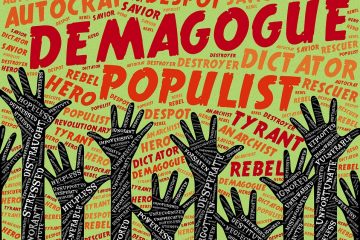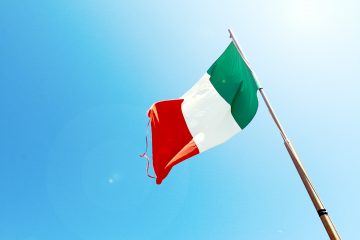
Our Day Will Come: The Inevitability of Irish Unification as Brexit Approaches
On June 23rd, 2016, the citizens of the UK voted to leave the European Union. This began an unprecedented process of dissociation, commonly known as Brexit. Among the many challenges that Brexit poses is how to handle the border between Britain and the Republic of Ireland. In the recent past, the “soft” border between the two nations has allowed for the free flow of people and goods. However, if Brexit negotiations fail, a “hard” border will replace the currently soft border between the Republic and Northern Ireland. This presents a problem because under present conditions the border allows for mutually beneficial economic and social exchange, as well as having been instrumental in guaranteeing the Northern Irish peace process. This border …

When are Green parties successful?
In 2018 Green parties are experiencing unprecedented levels of success in several advanced democracies; however, in a great many others they remain only minor footnotes to national electoral contests. Zack P. Grant argues that variation in Green party support is largely a function of good economic times, the presence of tangible environmental disputes, and mainstream parties actively attempting to emulate the positions of the Greens on their core issues (though the latter is dependent upon the age of Green parties themselves). Though it has attracted far less academic attention and media fuss than the ongoing ‘rise of the populist right’, several advanced democracies are currently undergoing a pronounced ‘Green surge’. After a somewhat disappointing 2017, in which they suffered parliamentary …

No New Cold War: Give Strategic Interdependence a Chance
With its concept of strategic autonomy, the EU risks triggering a new Cold War. In the context of globalisation and digitisation, it should focus on strategic interdependence instead. Annegret Bendiek provides a counterpoint to Paul Timmers on strategic autonomy and cybersecurity. Europe’s foreign and security policy framework has changed fundamentally since Donald Trump took office. With the US’s unilateral withdrawal from the Paris Climate Agreement, declaration that NATO was “obsolete”, unilateral recognition of Jerusalem as the capital of Israel, and termination of the nuclear agreement with Iran, the political atmosphere in EU-US talks has noticeably cooled when it comes to upholding multilateral agreements. Meanwhile cooperation on a technical level in counter-terrorism and cybersecurity is still vital. Punitive US tariffs on European …

A gradual farewell? There will be no three-year transition period in Germany
Angela Merkel’s announcement on Monday to not run again in the 2021 election has initiated a period of transition in German politics. Yet, whether this process will last until the next election, as she suggested, is questionable. German chancellor, Angela Merkel, announced on Monday that she would not be running for a fifth term in office in the next federal election in 2021 and step down as the leader of her party in December. Her statement came less than 24 hour after her Christian Democratic Union party (CDU) had lost more than 10 percent of the votes in the state election of Hesse, marking the party’s worst result in the state since 1966. The election continued an overall downturn in …

Four Myths about Orbán’s Hungary
Even though Hungarians vote this Sunday, April 8th, this piece is not on the Hungarian parliamentary elections per se. Whilst the initial idea was to write a short summary of the state of the opposition to prime minister Viktor Orbán, I had to quickly realize that the average Western news consumer hardly knew anything about Hungary. Hence presupposing very little knowledge about the ins and outs of Hungarian politics, I will try to challenge some of the assumptions and myths extolled in recent news articles on the Hungarian elections by giving you some additional, contextual information. Myth #1: Hungary is an outright illiberal state Despite their thoroughly liberal roots, Fidesz – the larger party in the current government coalition in …

From the Parole Guerriere to Electoral Success: Italy’s Five Star Movement
The Five Star Movement is one of the most interesting political ‘experiments’ on political landscape of Western democracies. Once again Italy, which with Berlusconi has experienced Trumpism before Donald Trump, is a political laboratory for novel political phenomena that the world looks at, with a mixture of concern and excitement, to learn something about the future of our democratic systems. Only five years ago Beppe Grillo, a stand-up comedian and the founder of the Five Star Movement (M5S), launched his parole guerriere (warlike words) and M5S obtained a remarkable 25% of the national vote in its first electoral showing. Italian voters again expressed loudly and clearly their preference for the Five Star Movement in last weekend’s general election. The M5S not …

The Fall of the Liberal Project
Since the fall of the Berlin Wall, liberal ideals have defined Europe’s political order. Parties that questioned free trade and democratic checks-and-balances could hardly gain many votes. Cultural tolerance and religious neutrality was the norm. The EU was seen not only as an engine of wealth, but also as an ethical power spreading liberal norms throughout the world. This era is now approaching its end. Liberal ideals are under fire from Helsinki to Athens. There are many local variations of the anti-liberal surge, but let us not delude ourselves: populism is not just confined to Hungary, Greece and Poland. Nigel Farage and his populist party UKIP have triumphed in the Brexit referendum. The Freedom Party of Austria, which came to …

Berlusconi is Back and the Jaguar Will Weigh Heavily on the Next Italian Government
Over two decades have passed since Silvio Berlusconi announced his entry into politics in 1994. Since then, the Italian centre-left coalition has had a half-dozen leaders and has changed its name three times, Italy has seen the first Pope to resign in the history of the Catholic Church and witnessed the first re-election of a president in Italian democracy. Despite all of this, the “jaguar” – more famous for his eccentric metaphors, myriad scandals and oftentimes over-the-top theatrics than for his political achievements – is still there.[1] And, if we consider the Italian electoral system, Berlusconi will be there in the near future. The highly controversial Rosatellum bis – the new Italian electoral law approved by both the centre-left and …









